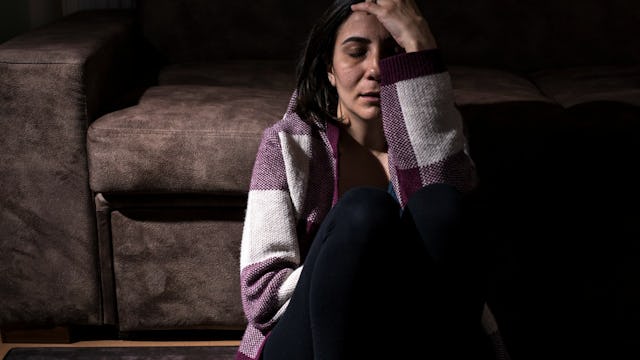I Had A Miscarriage 19 Years Ago, And I'm Still Grieving

Trigger warning: miscarriage and stillbirth
Nineteen years ago, I bought a down comforter and yellow duvet cover. I wanted my bedroom to be bright, hypocritically cheery even, so that when I came home from the hospital after the scheduled induction, the natural light and yellow accents might help me get out of bed in the morning.
Natural light. Such a silly thing to focus on, but that’s how I got through that day. I was angry. I was scared. I hated myself. I wanted to die.
Nineteen.
The number of weeks I was pregnant. Roughly the number of hours that passed from finding out my baby died in utero to when I delivered her.
Nineteen.
The age my daughter would be today.
The books don’t prepare you for what could happen. They’re all about snakes and snails, sugar and spice, and everything nice. They touch on the fact that 1 in 4 pregnancies ends in miscarriage, that it’s usually due to a chromosomal abnormality and so common most women have one, many before they even find out they’re expecting. It’s all clinical sounding. I should know as I became a voracious researcher of miscarriage, pouring through what research I could find. Maybe I was trying to justify why it happened to me. What I had done wrong. Where I had failed. I wanted, needed, to stop it from ever happening again.
Unfortunately, for me, miscarriage happened in 1 in 2 pregnancies, and hearing how common it was didn’t make it any easier. Being knowledgeable about it didn’t keep it from happening again. And again.
I rarely talk about my miscarriages. In fact, most people who know me have no idea I’ve had one, let alone three. My first pregnancy ended at the start of my second trimester. Fetal demise, they called it. What an awful term. To this day it makes me cringe, even more than photos from when feathered bangs were actually cool. My fifth pregnancy ended early, at six weeks. My second pregnancy ended nineteen years ago. It’s the most raw, and to this day, painful. I have no intention of sharing the intricacies of those horrible hours in depth. Those details are private, as is her name.
In many ways, I don’t believe I’ve earned the right to mourn publicly. Although she was stillborn, she doesn’t have a grave site to visit and my memories of that day are faded at the edges, partly because of the shock I endured, and also the guilt I’ve carried with me since. The only photo I have of her is a fourteen-week ultrasound where I still recall the tech commenting on how active she was. Losing her remains my unspeakable tragedy, a darkness that was so deep I felt like I was descending into the ocean past where any light can permeate.
But with every darkness, there is light. At the time, I didn’t know if I’d ever find it again, but it’s here — in my social justice driven daughter, my son whose ability to overcome adversity inspires me every day, and my youngest who brightens every room she walks into. It’s in my husband who held my hand on that day and didn’t say any of the words that people used to justify our tragedy, well-meaning as they were. Because at the time, I didn’t want to hear them.
If you’ve experienced miscarriage or stillbirth, whether it was a month or thirty years ago, I’m so sorry. I’ll say no more than that because those are the only words I wanted to hear. For me, it wasn’t the loss of a dream and it wasn’t going to be okay. I didn’t want to hear that I got pregnant once so I could do it again or that she was better off having died when she did because she would have been too disabled to live. It didn’t feel like a blessing to lose her, and disability or not, I loved her.
Please don’t feel sorry for me. I’m not asking for sympathy. Instead, hug someone who needs it. Be welcoming and have compassion for those looking for a better life. Forgive. Be kind. Be the person that I wanted to be for her. Have faith. Have hope. Love.